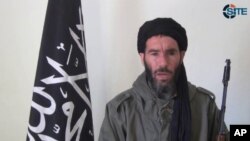BAMAKO —
A relatively new al-Qaida affiliate, calling itself al-Mua'qi'oon Biddam or "Those Who Sign with Blood," attacked a BP natural gas facility in Algeria Wednesday, taking dozens of foreigners hostage, along with an undisclosed number of Algerians.
The militant group says it was retaliating for Algerian cooperation with the French military operation against Islamist rebels in Mali. The latest reports say Algerian helicopters attacked the BP site Thursday, killing a number of hostages and their captors.
The leader of the group, Mokhtar Belmokhtar, has long topped the region's Most Wanted List.
Belmokhtar is a former commander of al-Qaida's North Africa branch, al-Qaida in the Islamic Maghreb, or AQIM, which has been active in northern Mali since 2007 when the Algerian-based Salafist group officially joined al-Qaida.
He reportedly broke off from AQIM in December 2012 with the aim of spreading jihad beyond the Sahara.
Dakar-based security analyst Andrew Lebovich said this new battalion appears to draw a core group of fighters from Belmohktar's cell under AQIM, the so-called "Masked Battalion." It remains closely related to the al-Qaida-linked Islamist militants currently fighting French and Malian forces in north and central Mali.
"There are probably personal differences between some of these leaders but this fragmentation, this separation into different groups appears to be a way to manage those differences while maintaining relatively uniform types of action," he said.
Belmokhtar has been linked to dozens of kidnappings-for-ransom and hostage negotiations in the Sahel in the past decade. His nicknames include "The Uncatchable" and "Mr Marlboro," for his heavy involvement in cigarette smuggling in the Sahel.
Yet, despite these criminal activities, security analysts like Lebovich say Belmokhtar is a hardened jihadist, trained by al-Qaida in Afghanistan and heavily involved in Algerian jihadist groups beginning in 1993.
"He's known for being a survivor, a dealmaker, for being very crafty," Lebovich said. "People forget that he has an exceptionally long jihadist pedigree. He traveled to Afghanistan when he was 17 years old, he lost his eye in Afghanistan. He fought from an early point with the GIA [Armed Islamic Group]. He was one of the first to join the GSPC [Salafist Group for Preaching and Combat], was a commander under AQIM, maybe is still a commander in AQIM, depending on how you define the structure. So this is a man who has been doing this for more than 20 years at this point."
The group calling itself "Those Who Sign with Blood" told the Mauritanian press Wednesday that the hostage-taking was in response to Algeria letting France use its air space to conduct air strikes in northern Mali against Islamist militant groups.
France began the aerial bombardments in Mali on Friday, at the request of the Malian government, after jihadist fighters began pushing south.
VOA spoke to a close Belmokhtar associate and a commander for another AQIM-offshoot in northern Mali, Oumar Ould Hamaha of the Movement for Unity and Jihad in West Africa on Wednesday. He said the hostage taking in Algeria was but the beginning of the "consequences" for countries contributing to the war against them in Mali.
The militant group says it was retaliating for Algerian cooperation with the French military operation against Islamist rebels in Mali. The latest reports say Algerian helicopters attacked the BP site Thursday, killing a number of hostages and their captors.
The leader of the group, Mokhtar Belmokhtar, has long topped the region's Most Wanted List.
Al-Qaida in the Islamic Maghreb (AQIM)
Al-Qaida in the Islamic Maghreb (AQIM)- Formed in the 1990's to fight Algeria's secular government
- Wants to rid North Africa of western influence and impose sharia
- Estimated to have amassed $100 million in kidnapping ransoms
He reportedly broke off from AQIM in December 2012 with the aim of spreading jihad beyond the Sahara.
Dakar-based security analyst Andrew Lebovich said this new battalion appears to draw a core group of fighters from Belmohktar's cell under AQIM, the so-called "Masked Battalion." It remains closely related to the al-Qaida-linked Islamist militants currently fighting French and Malian forces in north and central Mali.
"There are probably personal differences between some of these leaders but this fragmentation, this separation into different groups appears to be a way to manage those differences while maintaining relatively uniform types of action," he said.
Belmokhtar has been linked to dozens of kidnappings-for-ransom and hostage negotiations in the Sahel in the past decade. His nicknames include "The Uncatchable" and "Mr Marlboro," for his heavy involvement in cigarette smuggling in the Sahel.
Yet, despite these criminal activities, security analysts like Lebovich say Belmokhtar is a hardened jihadist, trained by al-Qaida in Afghanistan and heavily involved in Algerian jihadist groups beginning in 1993.
"He's known for being a survivor, a dealmaker, for being very crafty," Lebovich said. "People forget that he has an exceptionally long jihadist pedigree. He traveled to Afghanistan when he was 17 years old, he lost his eye in Afghanistan. He fought from an early point with the GIA [Armed Islamic Group]. He was one of the first to join the GSPC [Salafist Group for Preaching and Combat], was a commander under AQIM, maybe is still a commander in AQIM, depending on how you define the structure. So this is a man who has been doing this for more than 20 years at this point."
The group calling itself "Those Who Sign with Blood" told the Mauritanian press Wednesday that the hostage-taking was in response to Algeria letting France use its air space to conduct air strikes in northern Mali against Islamist militant groups.
France began the aerial bombardments in Mali on Friday, at the request of the Malian government, after jihadist fighters began pushing south.
VOA spoke to a close Belmokhtar associate and a commander for another AQIM-offshoot in northern Mali, Oumar Ould Hamaha of the Movement for Unity and Jihad in West Africa on Wednesday. He said the hostage taking in Algeria was but the beginning of the "consequences" for countries contributing to the war against them in Mali.




